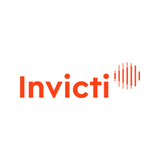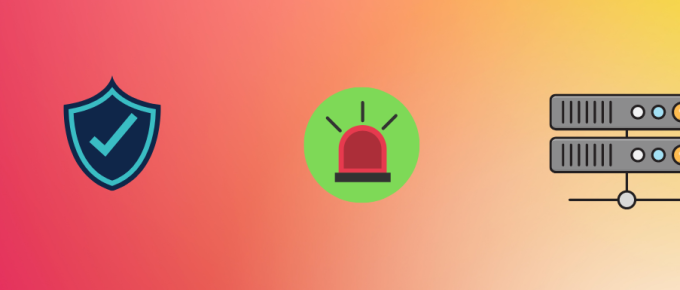
Top 12 Cloud-based DDoS Protection for Small to Enterprise Website

Don’t let the DDoS attack interrupt your business operation for reputational and financial loss. Use cloud-based denial of service protection to prevent getting hacked.
Anyone with bad intentions can hire a hacking service for a targeted attack. Malware tools are accessible, easy to use, and effective. Not just large companies, but cybercriminals are looking for any size vulnerable victims, including personal blogs, e-commerce shops, small to medium businesses.
One type of attack is particularly dangerous and increasingly common. It is called distributed denial of service attack, or DDoS for short. In a DDoS attack, a set of compromised, distributed systems –could be servers, home computers, Internet-of-Things devices, anything connected to the internet– is used to overwhelm a targeted system with a flood of requests, to the point in which the attacked system gets saturated enough to refuse to work.

Since the flood comes from many scattered sources, it is difficult to identify the attacker or to mitigate the attack. DDoS attacks are unpredictable, and some of the latest attacks are ridiculously dangerous. It was in a range of 800 to 900 Gbps.
Attackers can use many techniques to DDoS your online business. Some of the popular ones are the following.
- UDP fragment
- DNS, NTP, UDP, SYN, SSPD, ACK flood
- CharGEN attack
- TCP anomaly
The reasons for an attack could be many. First of all, the victims are hand-picked; they are never chosen at random. Maybe a competitor wants to kick you out of business, or maybe someone profoundly dislikes the content you publish –any excuse could be sufficient for someone to invest a couple of hundreds of dollars to attack your site.
You can take a look at cyber attacks in real-time.
How to prevent DDoS attacks?
If you own a small business with an equally small website, or you run a blog or a personal website, then you need to do something to avoid being a victim of a DDoS attack.
One option is to hire an MSSP (Managed Security Service Provider) to take care of all possible cyber threats. This includes intrusion detection, vulnerability scanning, anti-viral services, and provision of firewall and VPN technologies, among other services. A good MSSP will give you peace of mind, but probably at a high cost. In case you have most of the security bases covered and you only need to protect your site from DDoS, you can hire DDoS Protection as a Service (DPaaS) from your ISP or your hosting provider.
If you prefer a more DIY-ish solution, the first thing to implement is the detection and mitigation of DDoS. To detect a DDoS attack, you need to monitor incoming traffic to your website and look for any pattern that could imply an attack in the process. A sudden surge in traffic could be a signal, but you need to determine if the surge is a spike in legitimate user traffic or if it is the symptom of a DDoS attack, and that is not always an easy task.
Once you detect a true DDoS attack, you can identify the IP addresses sending the illegitimate traffic and block them with the help of your hosting provider or a traffic-filtering device, such as a router or a firewall. It sounds easy, right?
Well, if you take into account that a typical DDoS attack involves many millions of data packets per second, you can conclude that the DIY option is not viable, and you should hire an affordable cloud-based DDoS protection service.
How do DDoS protection services work?
An effective anti-DDoS solution must take care of the following tasks: detection, diversion, filtering, and analysis.
Detection means identifying traffic flow deviations that could be foretelling a DDoS assault. An effective anti-DDoS solution should be able to recognize the attack as soon as possible, avoiding false positives.
Diversion means to reroute the traffic away, either to discard it or to be filtered. By filtering, we mean to weed the DDoS traffic out, identifying it as malicious. An effective anti-DDoS solution will do this without affecting the experience of your legitimate users.
Finally, analysis is the review of traffic logs to gather information about attacks, both to identify the attacker and to enhance future detection activities.
When you need to compare anti-DDoS solutions, network capacity is an important factor to take into account. It is measured in Gbps (gigabits per second) or Tbps (terabits per second) and indicates how much attack intensity the protection can withstand. The cloud-based solution generally offers a network capacity of the order of terabits per second. This is much more than any website may require.
Other important measures of service level are forwarding rates and time to mitigation. The forwarding rate represents the capacity of the solution to process data packets and is measured in millions of packets per second (Mpps). Attacks commonly reach 300-500 Gbps, and some could scale up to 1 Tbps. The anti-DDoS solution processing capacity needs to top that in order to be effective.
Time to mitigation varies according to the method that the solution provider employs to detect an attack. An always-on solution with preemptive detection should be able to offer almost instantaneous mitigation. But this aspect needs to be tested in the field under real-life conditions.
Obviously, all these considerations must be weighed against the cost. Let’s take a look at some of the best cloud-based DDoS detection and protection solutions available.
Akamai
Kona DDoS Defender is the name of the cloud-based solution Akamai offers to stop the threat of a DDoS attack. It combines the uninterrupted service of a Security Operations Center (SOC) with Akamai’s Intelligent Platform, which offers high scalability and guarantees the continuous operation of the website, even in the event of an attack.

Akamai’s Intelligent Platform is distributed worldwide, providing the ability to handle between 15% and 30% of the total global web traffic. It offers the necessary scalability to face even the biggest DDoS attack. When an attack occurs, Kona DDoS Defender automatically deflects SYN or UDP floods and absorbs HTTP GET and POST floods at the perimeter of the network, preventing them from reaching the core applications.
Sucuri
Sucuri offers a DDoS mitigation service that automatically detects and blocks illegitimate requests and traffic. The Sucuri service is backed by a cloud-based network capable of mitigating attacks against web applications or large networks. With the aid of machine learning technology and by correlating data across its global network, Sucuri is able to protect a website from security threats not yet discovered.

The DDoS mitigation service is part of an all-in-one website security platform that includes malware removal, hack cleanup, blacklist monitoring, and firewall, among others. Its three plans offer different levels of service, from basic to enterprise, and their prices range from $ 199.99 per year to $ 499.99 per year.
AppTrana
AppTrana provides instant protection against vulnerabilities identified & ensures round-the-clock protection against DDoS & emerging security threats.
- Infrastructure Protection (Layer 3 & 4).
- Website Protection (Layer 7)
- Fully Managed DDoS protection with 24×7 monitoring and unlimited custom rule updates by security experts in real-time based on alerts and vulnerability risks found on-site to ensure the availability of the website.
AppTrana’s Global Threat Intelligence platform ensures protection is continuously on, accurate, and up to date with defense against the latest threats.

AppTrana DDoS protection is available in AppTrana Advanced and Premium plans. You can get it started with the trial plan to enjoy the services of application scanning, web application firewall, and CDN. Onboarding happens in a few minutes, with zero downtime during the transition.
Netscout
Through its Arbor Threat Mitigation System (TMS) and Availability Protection System (APS), Netscout offers a product suite that works in conjunction with its Arbor Sightline Solution to surgically remove up to 140 Tbps of DDoS attack traffic from the customer’s network, with no interruptions of the core network services. It works with IPv4 or IPv6 infrastructure, and it is capable of stopping DDoS attacks through mobile apps, protecting the performance and availability of mobile networks.

Arbor APS offers many deployment options, including an on-premise appliance, a virtualized solution, and a managed service. The solution provides proactive mitigation capabilities to stop known and emerging threats before they can affect application availability, thanks to its own Atlas infrastructure, which watches ⅓ of all internet traffic.
SiteLock
To provide comprehensive protection against DDoS attacks, SiteLock secures the most vital organs of a website: infrastructure, DNS, and web applications. It also provides advanced visitor identification –differentiating humans from malicious bots– and detailed attack reports, so you will not be blindfolded while your site is resisting an attack.

With more than one Tbps of network capacity, SiteLock automatically detects DDoS attempts and deploys its defenses accordingly, being able to block up to 16 Mbps of directed malicious traffic. It offers simple setup procedures, with expert assistance 24/7/365 and pricing plans that start at $ 149.99 per site/year.
Link11
Link11 is a leading IT security provider focusing on DDoS protection for websites and IT infrastructures. The cloud-based protection solution guarantees availability at all times thanks to the highly sophisticated use of artificial intelligence.
Link11´s web and infrastructure DDoS protection filters out malicious traffic through a global server network before it reaches its target thanks to its highly intelligent solution. That is how Link11 guarantees the fastest time to mitigate on the market for every vector in 0-10 seconds. Even unknown attack vectors are recognized and mitigated immediately.

Besides delivering unlimited protection in terms of attack duration, the solution runs fully automated and as an always-on service, ensuring the preclusion of human error. In addition, the company runs its own Europe-based 24/7 service & hotline and offers an uncomplicated and fast setup for new customers. This way, Link11 ensures quick and easy help even when a company is under attack.
The Link11 Security Operation Center (LSOC) regularly publishes reports regarding new risks and trends in the DDoS threat landscape.
Cloudflare
Cloudflare‘s always-on DDoS protection solution is based on the intelligence of its constantly learning global network. Called Anycast, this network spans more than 190 cities, with all the stack of security services running at each point of presence. This infrastructure allows Cloudflare to provide a layered security approach that consolidates many DDoS capabilities (layer 3/4/7, DNS amplification/reflection, SMURF, ACK, etc.) into a single service.

From the user’s perspective, the DDoS solution can be controlled through an intuitive interface that allows you to secure online properties with a few clicks quickly. Cloudflare pricing plans cover unlimited mitigation, regardless of the size of the attack, with no penalties for spikes and no extra or hidden costs.
StackPath
The DDoS mitigation technologies used by StackPath cover all attack methods: UDP, SYN, and HTTP floods, and all layers: layers 3/4 (network) and layer 7 (application). The total network capacity of 65 Tbps guarantees that the StackPath global network can mitigate even the largest DDoS attacks, minimizing the impact on the online services attacked.

The StackPath customer portal provides real-time data and insights, allowing the user to analyze the modus operandi of the attackers and create policies on the fly. Advanced users can also adjust DDoS threshold settings through a control panel, to adapt the protection to specific needs.
DDoS protection is part of a broad portfolio of edge services offered by StackPath, which include edge computing, edge delivery, and edge monitoring.
Alibaba
Anti-DDoS Pro by Alibaba can mitigate high-volume attacks up to 10 Tbps and support all protocols TCP/UDP/HTTP/HTTPS.

You can use Anti-DDoS to protect not just hosted in Alibaba but as well as hosted on AWS, Azure, Google Cloud, etc. If your application is hosted in China, then there are very few CBSP that can offer security protection, and Alibaba is one of them.
It is not just about mitigating the risk, but the Alibaba Anti-DDoS solution can help to track the source of attacks. Charges are based on usage, and you are in full control to customize the strategies for your business to reduce the cost.
AWS Shield
Amazon offers a DDoS protection service called AWS Shield, specifically for applications hosted on AWS. The protection service provides always-on detection and online, automatic mitigation that can be used without requiring AWS Support.

Amazon offers AWS Shield in two service plans: Standard and Advanced. AWS Shield Standard is available to all AWS customers at no extra cost. It protects against the most common DDoS attacks, which generally take place in layers 3 or 4 of the network stack. The Advanced version offers detection and mitigation of sophisticated, large scale DDoS attacks, together with real-time visualization and AWS WAF, a firewall for web applications. AWS Shield Advanced also offers uninterrupted access to the AWS DDoS Response Team (DRT) and protection against DDoS peaks.
Cloud Armor
If you are hosting an application on Google Cloud, do try Cloud Armor. The only limitation is that it works only with Google Cloud HTTP(s) load balancer.0

You’ll benefit from the Google experience to protect their services like Gmail, YouTube, Search, etc. Some of the benefits of Cloud Armor are:
- Protection against infrastructure and application
- Create custom rules
- IP and Geo-based access controls
- Powerful logging on Stackdriver
Incapsula
Incapsula offers comprehensive protection to mitigate any types of DDoS attacks from layers 3, 4 & 7.
- TCP SYN+ACK, FIN, RESET, ACK, ACK+PSH, Fragment
- UDP
- Slowloris
- Spoofing
- ICMP
- IGCP
- HTTP, connection, DNS flood
- Brute force
- NXDomain
- Ping of death
- And much more…
It’s available as always-on or on-demand to detect and mitigate all attacks. Incapsula network consists of 44 data centers with over 6 Tbps capacity. If you are under attack and need emergency support to minimize the risk in minutes, then you can contact the “Under Attack” team.
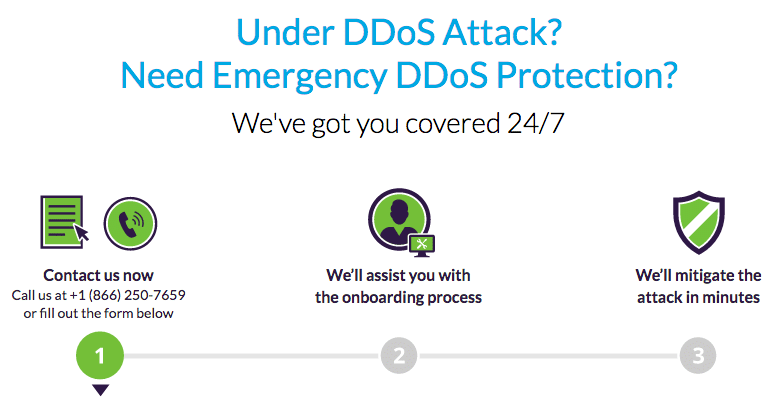
Final Words 👨🏫
If all the houses in your neighborhood have alarms, then yours should also have one, or it would be the preferred target for burglars. The same applies to your website or web application: you don’t want it to be one of the few without DDoS protection, or it may soon be attacked. A solution against DDoS is a reasonable and necessary investment if you want your online business to stay alive and kicking for a long time.
More great readings on Security
-
 12 Security Features Your Web Hosting Provider Should HaveAnkush Das on April 27, 2022
12 Security Features Your Web Hosting Provider Should HaveAnkush Das on April 27, 2022 -
 How to Use Nmap for Vulnerability Scan?Ashlin Jenifa on April 7, 2022
How to Use Nmap for Vulnerability Scan?Ashlin Jenifa on April 7, 2022 -
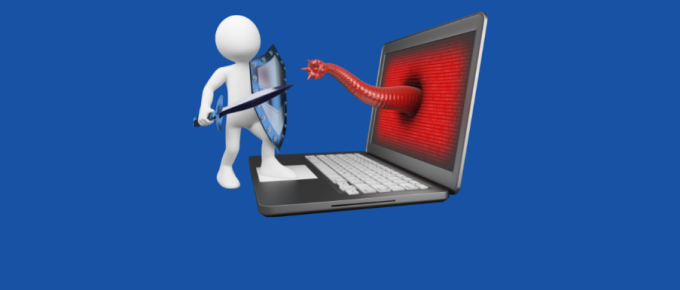 7 Best Online Virus Scanners for FilesDhruv Parmar on April 10, 2022
7 Best Online Virus Scanners for FilesDhruv Parmar on April 10, 2022 -
 10+ Common Types of Hacks and Hackers in CybersecurityAmrita Pathak on March 23, 2022
10+ Common Types of Hacks and Hackers in CybersecurityAmrita Pathak on March 23, 2022 -
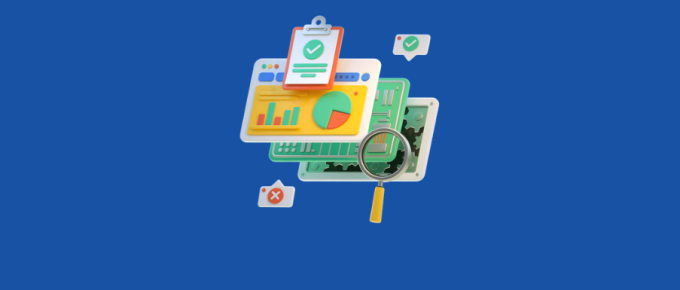 Astra Pentest Reviewed – Easy, Continuous Vulnerability Scanning & ComplianceGeekflare Editorial on March 23, 2022
Astra Pentest Reviewed – Easy, Continuous Vulnerability Scanning & ComplianceGeekflare Editorial on March 23, 2022 -
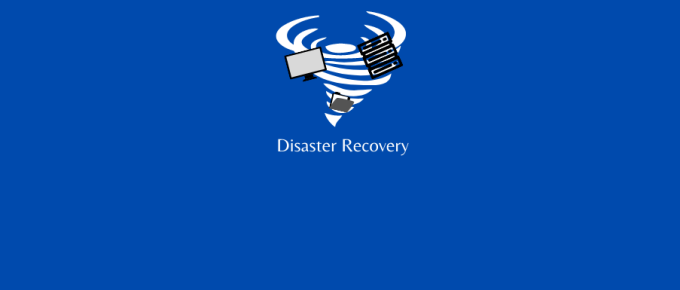 Understanding Disaster Recovery Terminologies – RTO, RPO, Failover, BCP, and moreAmrita Pathak on March 20, 2022
Understanding Disaster Recovery Terminologies – RTO, RPO, Failover, BCP, and moreAmrita Pathak on March 20, 2022







